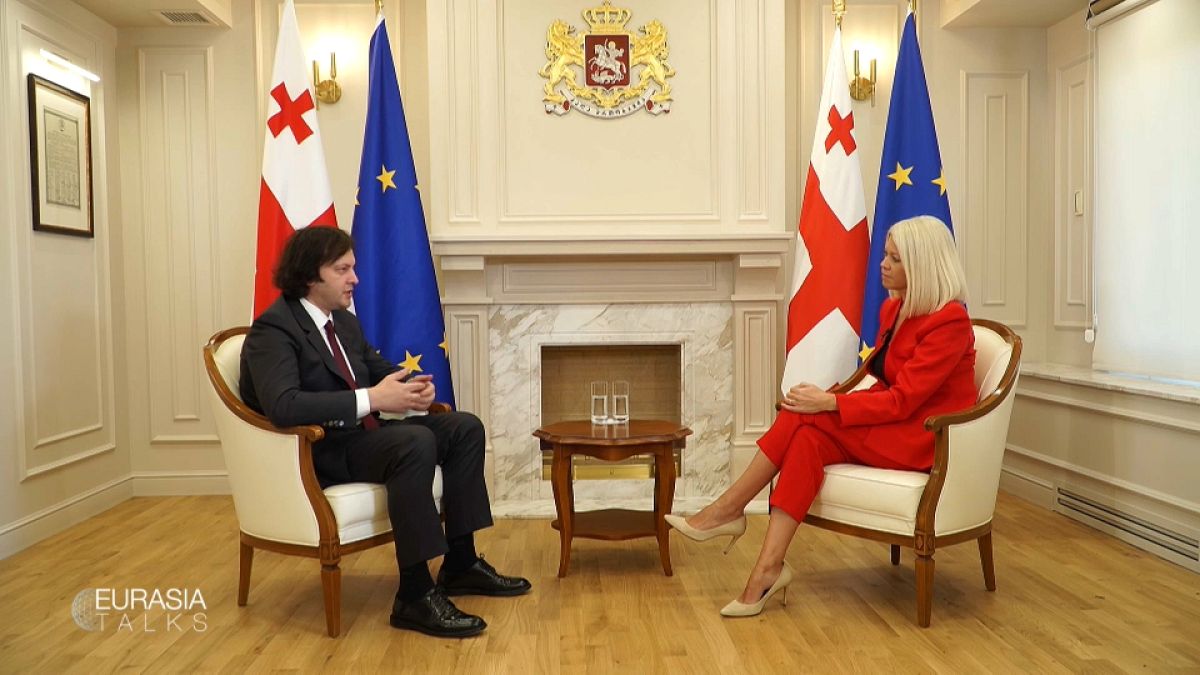Georgia is gearing up for crucial parliamentary elections on Sunday, with the country’s Prime Minister Irakli Kobakhidze discussing the significance of the vote and the nation’s aspirations to join the European Union. The elections are the first to be held under a fully proportional system in Georgia, marking a pivotal moment that could shape the country’s future integration within the EU and its distancing from Russian influence. The political landscape in Georgia has become increasingly polarized as the election date approaches, with conflicting opinion polls adding to the uncertainty surrounding the outcome.
The ruling Georgian Dream party is framing the vote as a choice between ‘peace and war’, while opposition parties view it as a battle between the democratic West and authoritarian Russia. Prime Minister Kobakhidze emphasized the importance of Georgia’s European ties, noting the historical association of Europe with Christianity and the country’s desire to be a part of the European family. Being a member of the EU would not only signify a historic choice for Georgia but also bring about higher levels of prosperity and development for its citizens.
Despite concerns about Russian involvement in other countries’ elections, Kobakhidze dismissed the idea of Russian influence in Georgia, stating that there are no political parties or media channels that enjoy Russian influence in the country. This assertion suggests that Georgia’s elections are likely to be free from external interference. The Prime Minister’s comments reflect Georgia’s commitment to its foreign policy priority of European integration and emphasize the country’s determination to chart its own course.
As Georgia stands at a crossroads ahead of the parliamentary elections, the outcome of the vote will have far-reaching implications for the nation’s future trajectory. The stakes are high, with the election representing a critical moment in determining Georgia’s alignment with either the European Union or Russia. The country’s historical ties to Christianity and its aspirations for a prosperous future underscore the importance of the upcoming elections in shaping Georgia’s path forward.
As the election date draws closer, the political debate in Georgia has intensified, with both the ruling party and opposition factions positioning themselves on opposite ends of the spectrum. The ruling Georgian Dream party’s framing of the vote as a choice between ‘peace and war’ reflects the broader narrative surrounding the election, while opposition parties view it as a crucial moment for Georgia to assert its democratic values and resist external influences. The outcome of the elections will not only determine the composition of Georgia’s parliament but also set the tone for the country’s future relations with the EU and Russia.
In his interview with Euronews, Prime Minister Kobakhidze reiterated Georgia’s commitment to European integration and emphasized the country’s desire to be part of the European family. The Prime Minister’s remarks underscore Georgia’s historical ties to Europe and the potential benefits that EU membership could bring in terms of prosperity and development. By dismissing concerns about Russian influence in Georgia’s elections, Kobakhidze sought to reassure the international community of the country’s commitment to holding free and fair elections. As Georgia prepares to cast its votes on Sunday, the world will be watching closely to see which direction the country chooses to take in the days and years to come.











